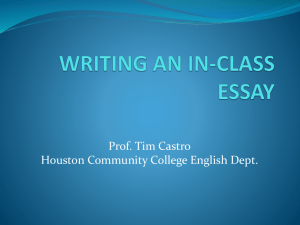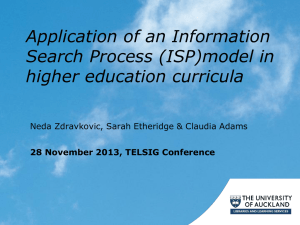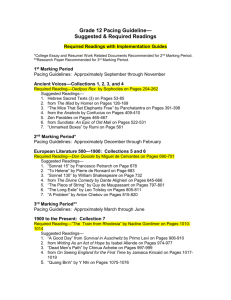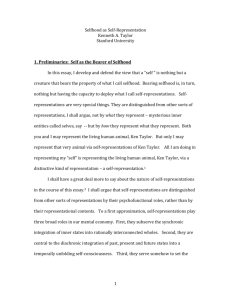psychological anthropology - University of Wisconsin–Milwaukee
advertisement
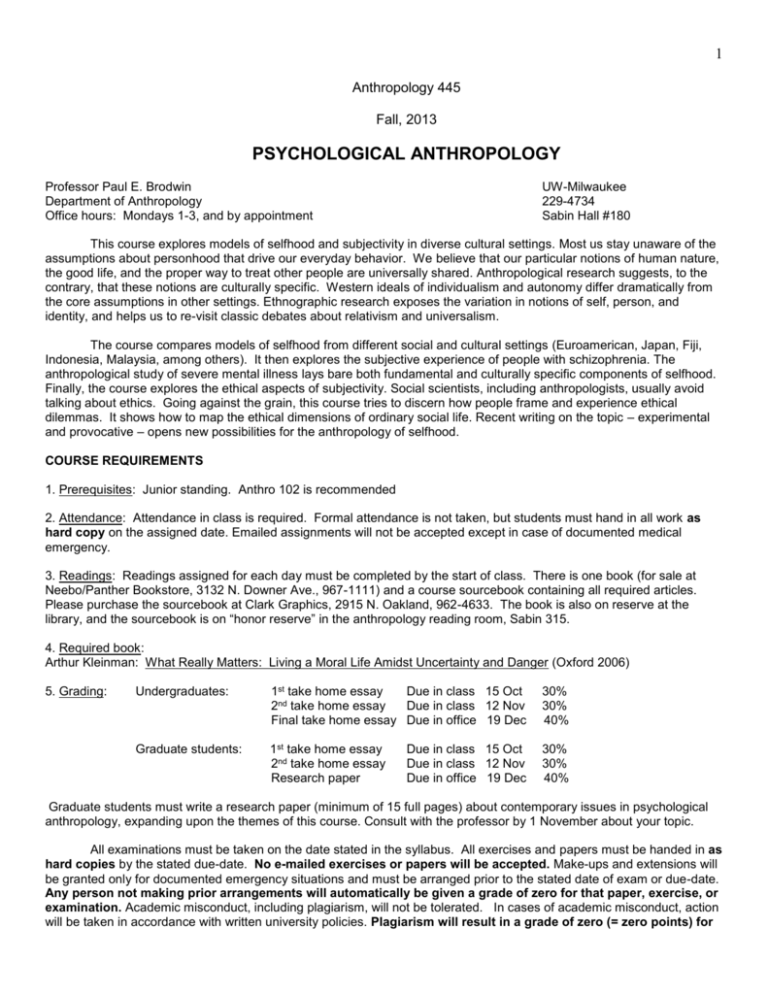
1 Anthropology 445 Fall, 2013 PSYCHOLOGICAL ANTHROPOLOGY Professor Paul E. Brodwin Department of Anthropology Office hours: Mondays 1-3, and by appointment UW-Milwaukee 229-4734 Sabin Hall #180 This course explores models of selfhood and subjectivity in diverse cultural settings. Most us stay unaware of the assumptions about personhood that drive our everyday behavior. We believe that our particular notions of human nature, the good life, and the proper way to treat other people are universally shared. Anthropological research suggests, to the contrary, that these notions are culturally specific. Western ideals of individualism and autonomy differ dramatically from the core assumptions in other settings. Ethnographic research exposes the variation in notions of self, person, and identity, and helps us to re-visit classic debates about relativism and universalism. The course compares models of selfhood from different social and cultural settings (Euroamerican, Japan, Fiji, Indonesia, Malaysia, among others). It then explores the subjective experience of people with schizophrenia. The anthropological study of severe mental illness lays bare both fundamental and culturally specific components of selfhood. Finally, the course explores the ethical aspects of subjectivity. Social scientists, including anthropologists, usually avoid talking about ethics. Going against the grain, this course tries to discern how people frame and experience ethical dilemmas. It shows how to map the ethical dimensions of ordinary social life. Recent writing on the topic – experimental and provocative – opens new possibilities for the anthropology of selfhood. COURSE REQUIREMENTS 1. Prerequisites: Junior standing. Anthro 102 is recommended 2. Attendance: Attendance in class is required. Formal attendance is not taken, but students must hand in all work as hard copy on the assigned date. Emailed assignments will not be accepted except in case of documented medical emergency. 3. Readings: Readings assigned for each day must be completed by the start of class. There is one book (for sale at Neebo/Panther Bookstore, 3132 N. Downer Ave., 967-1111) and a course sourcebook containing all required articles. Please purchase the sourcebook at Clark Graphics, 2915 N. Oakland, 962-4633. The book is also on reserve at the library, and the sourcebook is on “honor reserve” in the anthropology reading room, Sabin 315. 4. Required book: Arthur Kleinman: What Really Matters: Living a Moral Life Amidst Uncertainty and Danger (Oxford 2006) 5. Grading: Undergraduates: 1st take home essay Due in class 15 Oct 2nd take home essay Due in class 12 Nov Final take home essay Due in office 19 Dec 30% 30% 40% Graduate students: 1st take home essay 2nd take home essay Research paper 30% 30% 40% Due in class 15 Oct Due in class 12 Nov Due in office 19 Dec Graduate students must write a research paper (minimum of 15 full pages) about contemporary issues in psychological anthropology, expanding upon the themes of this course. Consult with the professor by 1 November about your topic. All examinations must be taken on the date stated in the syllabus. All exercises and papers must be handed in as hard copies by the stated due-date. No e-mailed exercises or papers will be accepted. Make-ups and extensions will be granted only for documented emergency situations and must be arranged prior to the stated date of exam or due-date. Any person not making prior arrangements will automatically be given a grade of zero for that paper, exercise, or examination. Academic misconduct, including plagiarism, will not be tolerated. In cases of academic misconduct, action will be taken in accordance with written university policies. Plagiarism will result in a grade of zero (= zero points) for 2 the entire essay. For further rights and responsibilities as a student, please consult www.uwm.edu/Dept/SecU/SyllabusLinks.pdf To maintain a good learning environment and to respect your fellow students, turn off all cell phones, Blackberries, etc. in class. Do not send or receive text messages in class. Personal computers are allowed only for taking notes. Using computers for other purposes (email or websites) will lead to a ban on computers in class. ************************* Subjectivity & Models of Selfhood: Western and Comparative Perspectives 3 Sept Introduction to course 5 Sept Questioning our native models and the mission of psychological anthropology READINGS: Lindholm: Chap 1 10 Sept Roots of individualism in the West READINGS: Lindholm: Chap 2 12 Sept Classic text of Western individualism READINGS: Hobbes: Chapter 13: Of the Natural Condition of Mankind… Missner: The main issue in Leviathan 17 Sept Ethnography of individualism in contemporary urban US READINGS: Kusserow: Chapter 4: Queenston hard protective individualism 19 Sept READINGS: 24 Sept Japanese self-portrait READINGS: 26 Sept 1 Oct 3 Oct READINGS: Kusserow: Chapter 5: Individualism in …Parkside Doi: Chapter 1: The first idea of amae Chapter 2: The world of amae Doi: Chapter 3: The logic of amae Ethnographic case study: selfhood and emotions in a Pacific island society READINGS: Lutz: Need, nurturance and the precariousness of life…, pp. 119-140 READINGS: Lutz: Need, nurturance and the precariousness of life…, pp. 140-154 Hand out 1st take home essay questions Selfhood and Subjectivity in the Experience of Schizophrenia 8 Oct What is schizophrenia? Case studies and first-person experience READINGS: Diagnostic and Statistical Manual (DSM-III) (excerpts): Emilio; Worms; Under Surveillance; The Witch Leete: How I perceive and manage my illness 10 Oct In-class peer critique of 1st take home essay 15 Oct Turn in 1st take home essay Watch DVD: “Out of the Shadow” about treatment of schizophrenia in US 17 Oct Subjective experience of people diagnosed with schizophrenia READINGS: Lally: Does being in here mean there is something wrong with me? Estroff: Self, identity, & subjective experiences of schizophrenia 3 22 Oct How to study the narratives of people with schizophrenia READINGS: Estroff: Subject/subjectivities in dispute… 24 Oct Overlap between psychological and psychiatric anthropology READINGS: Jenkins: Schizophrenia as a paradigm case for understanding fundamental human processes 29 Oct Comparative research of schizophrenia READINGS: Murphy: Psychiatric labeling in cross-cultural perspective 31 Oct Ethnographic case study: Indonesia READINGS: Good and Subandi: Experiences of psychosis in Javanese culture Hand out 2nd take home essay questions 5 Nov Ethnographic case study: Malaysia READINGS: Barrett: Kurt Schneider in Borneo… 7 Nov In-class peer critique of 2nd take home essay Is Morality a Basic Ingredient of Selfhood? 12 Nov Turn in 2nd take home essay Social science framework for the study of moral subjectivity READINGS: Sayer: Chap 4, Beings for whom things matter (start reading) 14 Nov READINGS: Sayer: Chap 4, Beings for whom things matter (finish) 19 Nov Morality and modernity – reflections about contemporary European civilization READINGS: Bauman: Chap 1, Introduction: Sociology after the Holocaust 21 Nov Social psychology of morality FILM: Obedience to Authority READINGS: Burger: Replicating Milgram (focus on pp. 1-4) 26 Nov The social nature of evil? READINGS: Bauman: Chap 6: The ethics of obedience 28 Nov No class: Thanksgiving vacation 3 Dec How to study ethics and moral experience READINGS: Kleinman: What Really Matters, Introduction 5 Dec Case studies in the anthropology of moral experience READINGS: Kleinman: What Really Matters, chaps 2-3 10 Dec READINGS: Kleinman: What Really Matters, chaps 4-5 12 Dec READINGS: Kleinman: What Really Matters, chaps 7-8 Hand out final take home essay questions 19 Dec Turn in final take home essay, under door in Sabin 180 by 9:30 am Happy holidays! 4 Paul Brodwin, Department of Anthropology, University of Wisconsin-Milwaukee Guidelines for in-class peer critique of essay examinations I. Editorial comments Attribution of all direct quotations (any consistent style is acceptable). Correct spelling, grammar, and punctuation. II. Organization A. Is there an introduction? What does it accomplish? i. Provide a roadmap ii. State the thesis and main points B. Is there a logical outline? i. Does the first sentence of each paragraph advance the argument? Could you reconstruct the entire argument by reading only the first sentences? ii. Is each major point supported by several pieces of evidence? C. Does the author provide “mini-summaries” along the way? D. Is there a substantial conclusion? i. Does the author acknowledge loose ends or unanswered questions? Does he/she anticipate possible objections from the reader? ii. Is the conclusion more complex and/or more comparative than the introduction? III. Substantive argument A. Does the author accurately summarize the relevant texts and concepts? B. Does the author go beyond summaries, by skillful comparison, contrast and critique? Does the author shine new light on the topic or provide a mere book report? C. Does the author find the right balance between direct quotations and his/her interpretations? D. Is there an actual argument in the essay? Does the author devote enough space to each major part of the argument?



